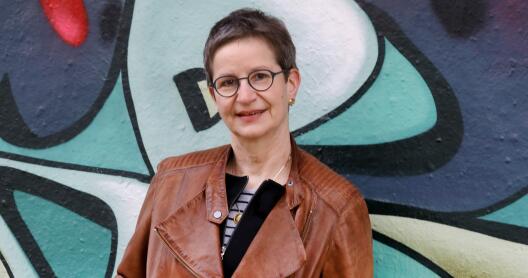“Mixing religion and literature can be a threat to life”
Literary scholar Wagner-Egelhaaf: attack on Salman Rushdie shows that societies must differentiate between religion, art and science – “Authors who take up religious motifs are still risking their lives”

Press release 16 August 2022
For literary scholar Martina Wagner-Egelhaaf, the life-threatening attack on British author Salman Rushdie shows how dangerous it is when societies fail to differentiate between religion and literature. “It is an indispensable achievement of society that both literary and scientific texts are not read and judged as religious texts”, says the scholar from the Cluster of Excellence “Religion and Politics” at the University of Münster. At the Cluster, she has also used the example of Salman Rushdie to explore the relationship between author, work and world, and is currently looking at hatred in literature and hatred that is created through literature.
“The Satanic Verses is a highly complex literary work that, unlike Rushdie’s enemies still claim today, is in no way a simple insult to religion or an incitement against Muslims”, she says. The postmodern novel from 1988 should be appreciated for its polyphony, its contradictions, and its irony. But it is also clear that “literature, literary studies, and criticism are powerless when religious fanatics, supported by the Iranian state, incite hatred towards a literary work, put passages together without context so that they are perceived as offensive, and create a threatening backdrop”.
The differentiation of politics, religion and art

Literature also deals of course with political and religious issues; it must be allowed to criticize, even in a provocative way, says Wagner-Egelhaaf. “But, while religion, politics and literature are largely differentiated systems in the ‘global north’, The Satanic Verses has mobilized protests since 1989 that do not recognize the systemic differentiation of politics, religion and art”. The scandal surrounding the publication became a political issue at a time when many academics attached little importance when interpreting texts to the author and her intentions. Reactions to The Satanic Verses also led to an increased discussion in Europe in the 1990s about the returning power of religion. “Discussion about the ‘return of religion or the gods’ coincide with talk of the return of the importance of the author”.
The case of Salman Rushdie shows that the reciprocal relationship between author and text can also be reversed, and how literature has an effect on its authors: “It’s frightening that, after many years when there was a supposed relaxation and normalization of Salman Rushdie’s everyday life, a new chapter has now begun in the scandal of the fatwa”. (sca/maz)

